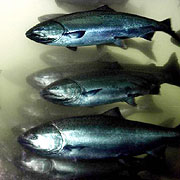forum
library
tutorial
contact

Judge Rejects Federal Plan to Save Salmon
by Tom KenworthyUSA Today, May 7, 2003
|
the film forum library tutorial contact |

|
Judge Rejects Federal Plan to Save Salmonby Tom KenworthyUSA Today, May 7, 2003 |
 A federal judge on Wednesday ruled that the government's plan to restore salmon in much of the Pacific Northwest violates the Endangered Species Act, a decision that could have sweeping economic and social consequences for the region.
A federal judge on Wednesday ruled that the government's plan to restore salmon in much of the Pacific Northwest violates the Endangered Species Act, a decision that could have sweeping economic and social consequences for the region.
Unless the decision by U.S. District Court Judge James Redden in Oregon is overturned, the federal government will have to overhaul its plan. The new proposal could include changes in how the Columbia and Snake rivers are regulated by a series of hydropower dams.
Redden's ruling revived hopes among environmentalists for a plan to breach, or partially tear down, four federal dams on the lower Snake River in eastern Washington state. Many scientists view the dams as the most important factor in the long decline of salmon and steelhead — ocean-going trout — that migrate to and from the Pacific Ocean.
A dozen populations of salmon and steelhead that rely on the two rivers are now listed as either endangered or threatened.
The government plan that was thrown out Wednesday had relied on improvements in fish habitat, better hatcheries and reducing harvests, factors that the judge ruled are "not reasonably certain to occur."
Environmentalists hailed the ruling. "They need to put dam breaching back on the table," said Jan Hasselman, counsel for the Seattle office of the National Wildlife Federation, one of 13 conservation and sportsmen's groups that challenged the plan. "The science is clear ... that removal of the four lower Snake dams is the surest way to recover these species."
The idea of breaching the dams is controversial in the region, where the two rivers are an important economic lifeline. The dams yield cheap electricity for homeowners and industry. The rivers also provide irrigation water for farmers and provide a way to transport paper products and grain from as far away as Montana.
Breaching the dams would cause about a 4% decline in the region's electricity supply and affect in a variety of ways the livelihoods of barge companies, farmers, industries such as aluminum production and inland port facilities as far upstream as Lewiston, Idaho.
Estimates vary on the economic impact. The Army Corps of Engineers said in 1999 that the costs would include electrical ratepayer increases of $1.20 to $6.50 a month, $24 million annually in higher river transportation costs, $134 million in reduced farm values and thousands of long-term jobs.
But a study by a respected regional consulting firm is less dire, citing the region's transition from natural resource industries and the positive economic impacts from a free-flowing Snake River on recreation and other pursuits.
It is unclear how the Bush administration, which inherited the plan from its predecessor, will respond: whether it will appeal and if not, how it might overhaul the plan. President Bush has been a staunch opponent of breaching the dams. He campaigned against it in the 2000 election.
learn more on topics covered in the film
see the video
read the script
learn the songs
discussion forum
